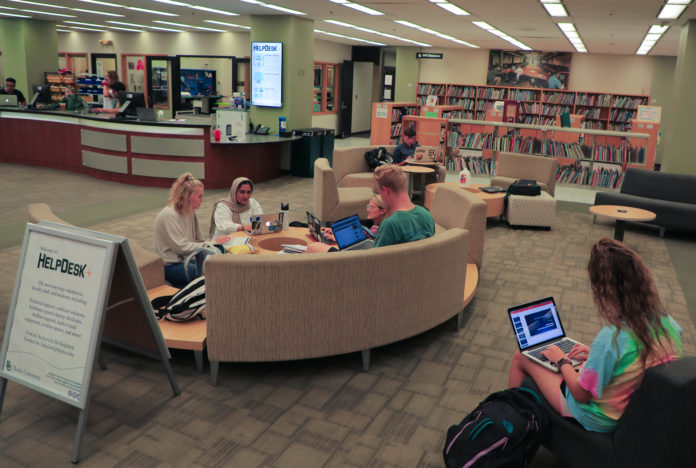
By Meredith Howard | Staff Writer
Although Moody Memorial Library is commonly referenced by students, Baylor has a variety of libraries on campus with resources and collections differing with location and topic.
Moody Memorial Library:
Moody is Baylor’s largest library, and is currently the only option offering 24-hour areas. Offerings in Moody include HelpDesk+, group study areas, Gregory Garden, Prichard Quiet Study Commons and Starbucks Coffee. Students can find research materials on a variety of topics at Moody and can make appointments online to meet with librarians who can help them find information on specific topics.
Jesse H. Jones Library:
Jones Library has two floors and is connected to Moody by a tunnel. Moody and Jones are together referred to as Baylor’s Central Libraries. One of Jones’ most distinctive features is the the Dennis Campbell Innovative Learning Space, which is located on the second floor. This area offers an 80-inch TV, a ceiling projector and Apple TV, and seats between 70 to 120 people, depending on the layout of the room.
W. R. Poage Legislative Library:
Poage is home to many of Baylor’s political materials. Mary Goolsby is the director of Poage and archivist of the Bob Bullock Archive.
“Our materials include papers created in office, personal papers and 3-D items, photographs, audio-visual materials, newspaper clippings, political cartoons, speeches, born-digital files and published material donated to supplement their collections,” Goolsby said.
Goolsby said that Poage is open to Baylor students and the general public, and that the library contains more than 30 collections available for viewing.
“Poage truly has something for just about everybody doing research in the humanities, social work, history, religious history, education…both qualitative and quantitative. Not enough people know about it,” Goolsby said.
Students interested in political materials can check out Poage online or email poage_library@baylor.edu to ask questions about the collections.
Armstrong Browning Library:
Armstrong Browning is home to more than 27,000 books and 11,000 letters and manuscripts. The library is known as a 19th-century research center “after adding substantial book and manuscript collections on Matthew Arnold, John Ruskin, Joseph Milsand, Ralph Waldo Emerson, Charles Dickens, as well as on many other 19th-century writers and on most areas of 19th-century culture,” according to Baylor libraries’ webpage.
Armstrong Browning is known for its unique and historic architecture, and in the past has been named one of the world’s 50 most beautiful college libraries.
Carroll Library:
Carroll houses the Texas Collection, the Keston Center and the University Archives. The Texas Collection collects materials on the history, heritage and culture of Texas. The Keston Center for Religion, Politics and Society contains information on religious persecution, religion in the USSR and more. Baylor received the Keston Collection in 2007, but it didn’t become an official offering until later.
“In 2012, the decision was made for the Keston Center to become part of the library system,” Kathy Hillman, director of the Keston Center, said.
The University Archives is housed within the Texas Collection, and it contains information about Baylor’s history and policies.
More information about all of Baylor’s libraries and their resources can be found on the Baylor Libraries web page.





